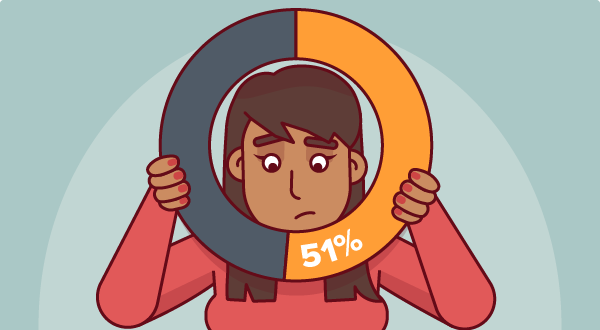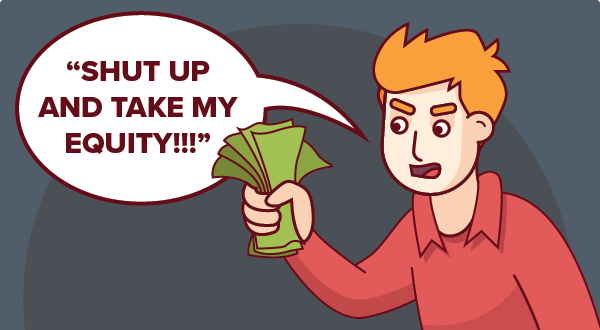The Startups Team

How to Create a Founders Agreement for Your Startup
A founders agreement covers everything from ownership structure to intellectual property rights to which the co-founder can make critical decisions over others. In short — every startup needs a Founders Agreement!

But do We Really NEED a Founders Agreement?
Since co-founders are often very familiar with each other, we can easily jump ahead and forget to formalize anything beyond our basic ownership structure. We snap up titles quickly ("You're the Chief Technology Officer! I'll be the Chief Operating Officer!") among all of the founders and go on our way. We're friends, right? That should be enough... right?
Being Friends doesn't Equal a Founders Agreement
And while all that is certainly true, we still need to get a founders agreement. A founders agreement, like all contracts, is there to help us not only navigate how our day-to-day operates but also to come to our aid when things don't go as planned.
Look - stuff happens. If one of the founders resigns today what happens to that founder's shares? If we've got a positive capital account balance at the end of the year, do we all get some of that cash? What if the other founders leave, can they take their related intellectual property with them? It's a lot, and it all needs to be determined before it happens.

Founders Agreements are too easy to Overlook
“When you first start a company, it's easy to forgo an operating co-founder agreement or other technicalities in favor of dreams and aspirations,” Meghdad Abbaszadegan, co-founder of Free Fall, writes. “It's not until you achieve success that money and greed come into play. Entrepreneurs stop thinking about the vision of their companies and begin to think about themselves. When my co-founder and I fell victim to this, Feel Free changed from a success story to a nightmare.”
What is a Founders Agreement?
A founders agreement is a legal contract that all co-founders agree to — ideally set by the company prior to launching. It can cover everything from who's involved, how much they'll contribute, roles and responsibilities of all co-founders, equity ownership, to what happens if someone leaves.

Is a Founder Agreement Legally Binding?
Yes. It's a legally binding contract that holds each founder's interests at stake and should be created at the beginning of the company's lifecycle (alongside the business plan or pitch deck), in order to get everything out on the table before a group of co-founders jumps in together.
What Should be Included in a Founders Agreement?
While there's no formal structure for a founders agreement, here are some things you should strongly consider including in yours.

Names of Founders and Company
This one is pretty non-negotiable. Founders agreements should have the names of everyone involved down on paper, first and foremost. Also, make sure the name of your startup is in there, even if it might change later.
It's hard to overestimate the importance of a startup name — which is why naming a business can feel so harrowing. A great name can help push your company to the next level, but a terrible one can sink you before you even started. So how do you find a great business name?
If you're getting hung up on this step because you're not sure what to name your startup, check out our guide to choosing a name for your startup.
Ownership Structure
This is where you determine what percentage of the company (equity ownership) each member — i.e. you and your cofounders — own.

This number can change as people join and leave the company. If your company is an LLC, you should also figure out what percentage of management interest each member owns.
That means, in your founders agreement, you need to determine if each person is just an owner in an economic sense or if they also play an active role in management and what those roles and responsibilities look like to all participating co-founders.
The Project
The Project is just another way of saying “your startup.” In this section, you'll want a sentence or two describing what your business plan is.
It should include a broad overview of what you're doing, each founder's interests, as well as some specifics that are particular to your startup. Think of the broad part as your elevator pitch and the specifics as what you'd say to a fellow nerd who asks for more details about what you're creating.

Initial Capital and Additional Contributions
Every founder of your startup contributed something to become a founder. That contribution could be cash, property, services rendered, a promissory note, or some combination of the above, or even a promise of one of the above. This will need to be included in the founders agreement.
What if a Co Founder has Non-Cash Capital Contributions?
If one of your co-founders contributes something other than cash, you all need to figure out the monetary value of that thing and record it here. You also need to figure out whether members will continue to contribute capital throughout the life of the company or just at that initial investment.
There's also the issue of non-refundable initial capital contributions. This is capital that goes in but doesn't come back out (in cash at least). It helps to have each co-founder in writing signed off on what they anticipate is a one-time contribution.
Expenses and Budget
In this section, you're not so much writing out your expenses and budget — you might not even know them at this point — as you are spelling out how you'll handle the budget and expense moving forward in mutual written consent.
For example, is one person in charge of the budget or can it be approved by the other founders? What about reimbursement for expenses that founders pay out of pocket? How should founders submit for reimbursement? That should all be spelled out in this section of the founders agreement.
Taxes
Tax stuff is tricky — and we suggest you hire a tax professional to help you draft out this part of your founders agreement. What you write here is going to be so specific to your company and your company structure, so please don't try to wing it on your own or copy it from a template.
Startups in their early stages need all the help they can get, and as the business grows, making sure details like taxes and legal services are written out properly in the founders agreement. This is one of those times that it's a good move to invest some of your runway.
Roles and Responsibilities
This is another one that you might think you have handled with a verbal agreement — or even an unspoken understanding of what everyone is good at — but don't fall into that trap.
Founders agreements should define every aspect of the roles and responsibilities for all co-founders involved and should be stated in mutual written consent to be referenced when needed as the business grows.

Beware of NOT Defining Roles Early!
“I started a company with four founders, and we didn't define roles,” remote working expert Jason Lengstrof writes. “What ended up happening is one person didn't do anything that wasn't interesting to them, one person would start a bunch of tasks and leave them half-finished for someone else to handle, and one person was only capable of handling process-based work, which left the fourth person (me) to handle everything else (and write the processes)."
"It bred resentment and made it very difficult to adjust roles going forward because it had been established that I could do everything and therefore I became the final point of responsibility, even if we'd defined new roles later. Our only way out was to sell the company.”
Be Very Clear Which Co-Founder is Responsible for What
Rather than letting your startup get to that point, make sure to spell out — in your founders agreement — who is responsible for what. By writing out each founder's role and responsibilities, you'll not only be making sure that the buck stops with whom it's supposed to stop, but also that you and your co-founders and rehashing each other's work.
Because that kind of inefficiency can lead to a startup's downfall. Plainly stated: you will not regret having a formal agreement on this, and really it's a roadmap for future employees as well.
Management and Legal Decision-Making, Operating, and Approval Rights
Each founders agreement should define clearly: who's going to be allowed to vote on company decisions? Who isn't? What parts will they be able to vote on? Some startups give voting rights based on a member's percentage interests (or founder equity), but others choose to give limited voting rights to certain groups.

You can also give veto rights but no voting rights; supermajority votes; or even managerial rights but no voting rights. This is one of many founders agreement ideas that should not be taken lightly.
Equity and Vesting
Equity. Stocks. Shares. Vesting. Fair market value. The minute you dive into figuring out startup equity compensation, you're slammed from every side with a bunch of words that you might have heard in the past and you might be able to fake knowledge of at a dinner party. Founder equity being one of the most common.

But let's be real: You definitely don't have an active, working knowledge of them. One paragraph into any explanatory founders agreements blog post and your eyes are already crossing, your fingers itching for the Facebook tab on your browser because all you want is to clear your brain with a mindless scroll through News Feed.
Lucky for you, we created an entire guide to startup equity. Check out Startup Equity 101 for everything you need to know for this section. (Pro tip: make sure you're clear on these terms before creating a founders agreement).
Salary and Compensation
How do you know how to fairly compensate yourself and your co-founders? This is a very tricky question and, like many issues related to money, it can be really disruptive. Some founders choose to not take any salary at all at the beginning, while others can't make that move and still continue to, you know, live.

Tailor to your Business Needs Specifically
Every startup is different, and every founder has a different relationship with every investor, so there is no real one-size-fits-all approach. There are good startup founder compensation policies, but also bad policies, and some policies that outright kill a startup.
All founders agreements need to include these details, so becoming familiar prior to opting into a partnership agreement of any kind, be familiar with who gets what (and make sure to not sell yourself short for the sake of seeing your startup grow).
If you're working to figure out this step, check out our guide to founder compensation and our guide to startup CEO salary.
Intellectual Property (IP) Assignment
Intellectual Property (IP) is everything that goes into making your startup unique. So the very first thing you have to do is determine what your intellectual property is. What sets you apart from the competitors? What is your startup producing, in-house?

What does Intellectual Property Include?
Your startup's IP could include blog posts, designs, app ideas, ideas in general, or something very specific to what you all do. Generally, anything created within work hours is considered company IP.
Some companies choose to make anything created with work property — like a work phone or laptop — company IP as well. It's up to you to decide if you want to go with that more hard-lined approach which can be defined at length when creating a founders agreement.
What if the IP Gets Sold?
You also need to outline when and how you and your co-founders would be okay with selling intellectual property. Who makes that decision? Is it a majority vote? Up to the CEO? A unanimous vote? And if that IP is sold, who gets the money?

Be sure to outline all of these factors in this section of your formal agreement for the business. At the very least the document should require a written notice to all co-founders (or those in the same class of stock) to move forward.
What About Non-Competes or NDAs?
The last thing to consider isn't so nice — but it is important. And that's a non-compete or confidentiality clause. These documents ensure that you and your co-founders can't go out and consult for your competitors — or even become a competitor.
It's probably not something you want to think about in the heady beginnings and early stages of a startup, but it's worth getting a plan in place, just in case.
Removal or Departure of Founders
If a member of your LLC dies, becomes disabled, goes bankrupt, or is fired — what are you going to do? This section gives remaining members the option to buy out that member's interests. If you do decide to include buyout rights, be sure to outline how a buyout would take place, the buyout price, and the payout terms.

How are Departing Co-Founders "Paid Out" if they Leave?
If you're stuck on the buyout price because your company is still young, consider either setting a price now or writing a provision the price will be based on fair market value at the time of the buyout. Then, let that number be determined by an impartial third-party appraiser.
It's very difficult to determine "the price" ahead of time and therefore what we're typically doing is determining a mechanism for the valuation.
Dissolution and termination clauses
No one likes to think about the end at the beginning, but it's best for everyone involved if you do. Outline what circumstances or events would lead to the dissolution of your company.
You should also spell out winding up procedures and waterfall distributions of your company's assets if your company dissolves.

Dispute resolution
What are you going to do if a dispute about something in this agreement comes up? This section is where you'll outline that procedure.
Many startup founders choose to require that any dispute with the founders agreement is settled with binding arbitration, but it's up to you and your co-founders to decide what you want to do.
How to Create a Founders Agreement
Here are some steps you can take to make a founders agreement. They're not binding, but they are a good general guide to follow as you work through this process.
1. Choose a template
There are templates all over the internet, including at the bottom of this article. Choose one that best fits your startup or create your own with pieces from different templates.
The goal is to create a founders agreement that best fits your, your cofounders', and your startup's needs. And while the legal talk might be intimidating, don't worry about it yet. We'll address that in Step 4.
2. Fill out the simple sections
Go through and fill out all the sections that don't take a lot of thought. Stuff like your names, where you're located, when the company started, the name of the company, if you have that worked out. Basically, it's the stuff that you don't have to consult with each other on.

3. Take the time to hash out the hard stuff
And then it's time for the hard conversations! This is when you and your co-founders need to go through all of the tricky stuff, from equity to compensation to termination, and figure out what you want to do.
These conversations can be difficult, and it's easy to veer into personal feelings and offense. Remember: You trust each other. You're working together. It's business, not personal. But you all need to protect your own interests and the interests of the company.
It's okay if these conversations take a few days or even a couple of weeks, but consider setting a date when it will be fully finished, just to make sure you don't keep going back and forth forever.
4. Get a Guiding Legal Hand
As we mentioned above, it's a good idea to get a tax expert to help you outline the tax section. But it's also a good idea to have your founders agreement reviewed by a lawyer because it is a legally binding agreement.
Having a professional, legal, and non-invested eye on the document can help ensure that you're all protected in the future. They're also likely to catch legal technicalities that you, as non-lawyers, might not have noticed.
5. Get a second opinion
But legal opinions aren't the only opinions! It can also be a good idea to ask a fellow entrepreneur or even an advisor to look over your founders agreement. (You can black out any personal or financial info if that makes you feel more comfortable.)
Fellow entrepreneurs may be able to give advice based on their own experience and also notice things that a lawyer might not. It's never a bad idea to utilize your community for something like this, assuming the community you've built is a solid and knowledgeable one. So use your networks!
6. Review and sign!
Finally, give each of your co-founders time to review their copy of the founders agreement, consult their lawyers if necessary, and then sign and date it.
Once it's been signed and dated by everyone, it's a legally binding document. Be sure to store an electronic copy with everyone's signatures that your whole team can access, for future reference.
Free Founders Agreement Template
Here are some founders agreement templates to help you get started. This isn't legal advice, but rather a starting place for you as you work on hammering out your own founders agreement. Remember: It's always a good idea to consult a lawyer for this!
PandaDoc Founders' Agreement Template
UPenn Founders' Agreement Overview
Free Founders Agreement Template
RocketLawyer Founders Agreement
22 Founders Agreement Templates from TemplateLab
Find this article helpful?
This is just a small sample! Register to unlock our in-depth courses, hundreds of video courses, and a library of playbooks and articles to grow your startup fast. Let us Let us show you!
Submission confirms agreement to our Terms of Service and Privacy Policy.
Already a member? Login
No comments yet.
Start a Membership to join the discussion.
Already a member? Login